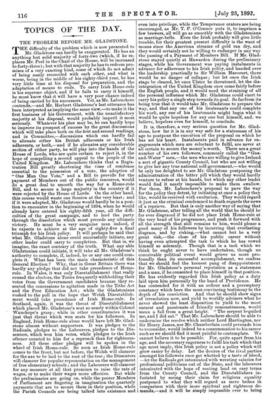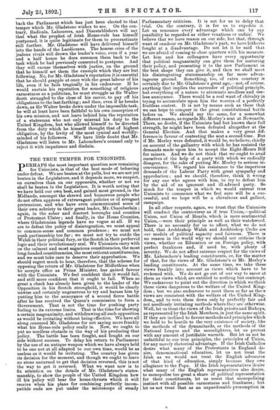TOPICS OF THE DAY.
TTHE PROBLEM BEFORE MR. GLADSTONE. HE difficulty of the problem which is now presented to Mr. Gladstone can hardly be exaggerated. He has an anything but solid majority of forty-two increased to he re- places Mr. Peel in the Chair of the House, will be ncreased to forty-three) ; but with that majority he has to redeem pro- mises of a very exacting kind, some of which do not admit of being easily reconciled with each other, and what is worse, being in the middle of his eighty-third year, be has very little time at his disposal for preparation, and the adaptation of means to ends. To carry Irish Home-rule is his supreme object, and if he fails to carry it himself, he must know that it will have a very poor chance indeed of being carried by his successors. Yet, as Mr. Labouchere contends,—and Mr. Herbert Gladstone's last utterance has been interpreted as implying the same view,—to make it the first business of his Government, with the unsatisfactory majority at his disposal, would probably imperil it most seriously. Whatever his plan may be, he can hardly hope to improve its prospect of success by the great discussions which will take place both on the first and second readings, and in Committee,—discussions which can hardly fail to alienate either his British adherents or his Irish adherents, or both,—and if he alienates any considerable section of either party, he will play into the hands of the House of Lords, who are quite certain to reject it, in the hope of compelling a second appeal to the people of the United Kingdom. Mr. Labouchere thinks that a Regis- tration Bill greatly shortening the time of residence essential to the possession of a vote, the adoption of " One Man One Vote," and a Bill to provide for the payment of Members out of the public resources, would do a great deal to smooth the way for a Home-rule Bill, and to secure a large majority in the country if it were rejected by the House of Lords. On the other hand, this course would waste one Session at the very least; and if it were adopted, Mr. Gladstone would hardly be in a posi- tion to encounter in the beginning of 1894, when he would already have entered his eighty-fifth year, all the diffi- culties of the great campaign, and to lead the party through the dissolution which must precede any ultimate victory. He must be a very sanguine man indeed, if he expects to achieve at the age of eighty-five a final triumph for his Irish policy. It will perhaps be said that what Mr. Gladstone alone could successfully initiate, any other leader could carry to completion. But that is, we imagine, the exact contrary of the truth. What any able Gladatonian could initiate, it will take all Mr. Gladstone's authority to complete, if, indeed, he or any one could com- plete it. What has been the main characteristic of this General Election ? Why, that in Great Britain there was hardly any pledge that did not take precedence of Home- rule.. In Wales, it was only Disestablishment that really roused the electors, the Tories frequently withholding their votes from the Government candidates because they re- sented the concessions to agitation made in the Tithe Act and the Free Education Act ; while the Gladstonians rushed to the poll in the hope that Welsh Disestablish- ment would take precedence of Irish Home-rule. In Scotland, again, it was the threat of Disestablishment which placed Mr. Gladstone's seat so nearly within Colonel Wauchope's grasp ; while in other constituencies it was just that threat which won seats for his followers. In England, Irish Home-rule alone would have left Mr. Glad- stone almost without supporters. It was pledges to the Radicals, pledges to the Labourers, pledges to the Dis- senters, which won him votes, while pledges to the Irish oftener counted to him for a reproach than for righteous- ness. All these other pledges will be spokes in the wheel of Irish Home-rule. So soon as Irish Home-rule comes to the front, but not before, the Welsh will clamour for the axe to be laid to the root of the tree ; the Dissenters will clamour for popular representation on the management of free elementary schools ; and the Labourers will clamour for any measure at all that promises to raise the rate of wages, or to make their wages more effective. But while the preliminaries are going on, while the poorer Members of Parliament are fingering in imagination the quarterly payments that are to secure them in their position, while the Parish Councils are being talked into existence and even into privilege, while the Temperance orators are being encouraged, as Mr. T. P. O'Connor puts it, to imprison a few brewers, all will go as smoothly with the Gladstonians as marriage-bells. Even the Irish probably will give little trouble, for their greatest present difficulty is the want of means since the American streams of gold ran dry, and they would certainly not be willing to endanger in any way the passing of a Payment of Members Bill. If Mr. Glad- stone stayed quietly at Hawarden during the preliminary stages, while his Government was paying instalments in advance for adherence to his Irish policy, and handed over the leadership practically to Sir William Harcourt, there would be no danger of collapse ; but let once the Irish stage be cleared, let once Ulster be threatened, let the dis- integration of the United Kingdom once come fairly before the English people, and it would need the straining of all the personal influence which Mr. Gladstone could exert to carry his policy a single step towards its goal. So far from its being true that it would take Mr. Gladstone to prepare the way, and that any one of his lieutenants could complete his work, any one of his lieutenants might begin what it would be quite hopeless for any one but himself, and, we believe, hopeless even for himself, to conclude.
It is, therefore, a very serious question for Mr. Glad- stone, how far it is in any way safe for a statesman of his age to postpone the execution of the proposal on which he has set his heart. Instalments paid in advance for en- gagements which men are reluctant to fulfil, are never at all certain to secure the money's-worth. There are a great number of his own followers, commonly called the "Gas- and-Water " men,—the men who are willing to give Ireland a sort of gigantic County Council, but who are not willing to give her any true national self-government,—who would be only too delighted to see Mr. Gladstone postponing the administration of the bitter pill which they would hardly venture to refuse at his hands, but which any other leader would find it nearly impossible to make them swallow. For them, Mr. Labouchere's proposal to pave the way for the policy they detest, by initiating at once a policy they like, would be received with exultation. They would regard it just as the criminal condemned to death regards the news of a reprieve. But that is only another way of saying that Mr. Gladstone, after telling all the world that he should be for ever disgraced if he did not place Irish Home-rule at the very head of his programme, and push it forward with all the strength that still remains to him, would please a good many of his followers by incurring that everlasting disgrace, and by risking,—what cannot but be a very great risk,—the close of his public career without having even attempted the task to which he has vowed himself so solemnly. Though that is a task which we think he ought never to have undertaken, though no conceivable political event would grieve us more pro- foundly than its successful accomplishment, we confess that we should feel the keenest pang of disappointment for Mr. Gladstone's personal reputation as a statesman and a man, if he consented to place himself in that position. He has evidently regarded this Irish policy as a duty laid upon him personally by the hand of Providence. He has contended for it with an ardour and a peremptory constancy which bore the most convincing testimony to the depth of his conviction. And that he should show signs of irresolution now, and yield to worldly advisers what he never showed the least disposition to yield to the most earnest and passionate of friendly remonstrances, would mean a fall from a great height. " The serpent beguiled me, and I did eat." That Mr. Labouchere should be able to undermine the resolve which neither Lord Hartington, nor Sir Henry James, nor Mr. Chamberlain could persuade him to reconsider, would indeed be a consummation to his career such as we should find it most painful to contemplate. We cannot believe it to be possible. For, quite apart from his age, and the necessary eagerness to fulfil his task which that age must imply, this Irish policy is not a policy which will grow easier by delay. Let the desires of the rival parties amongst his followers once get whetted by a taste of blood, —let the Radicals get intoxicated with wresting salaries for professional politicians out of the State, and the labourers intoxicated with the hope of renting land on easy terms from the County Council, and the Disestablishers in- furiated by seeing their claim for religious equality postponed to what they will regard as mere bribes in comparison with their more spiritual and righteous de- mands,—and it will be simply impossible ever to bring back the Parliament which has just been elected to that temper which Mr. Gladstone wishes to see. On the con- trary, Radicals, Labourers, and Disestablishers will say that what the prophet of Irish Home-rule has himself postponed, it is quite legitimate for them to procrastinate still further. Mr. Gladstone will have delivered himself into the hands of the Laodiceans. The hoarse cries of the jealous rivals will drown the leader's voice, even if a year and a half hence he does summon them back to the task which he had previously consented to postpone. And they will excuse themselves with justice, on the ground that he himself set them the example which they are but following. No, for Mr. Gladstone's reputation it is essential that he should grapple at once with the great labour of his life, even if he fails tragically in his endeavour. If he would sustain his reputation for something of religious earnestness as a politician, he must struggle as Sir Walter Scott struggled to the close of his career, to pay off his obligations to the last farthing ; and then, even if he breaks down, as Sir Walter broke down under the impossible task, he will at least have been faithful to his own conception of his own mission, and not leave behind him the reputation of a statesman who not only misread his duty to the United Kingdom, but who allowed himself to be diverted from the duty which he himself thought that of highest obligation, by the levity of the most cynical and worldly- minded of his followers. We have little doubt that Mr. Gladstone will listen to Mr. Labouchere's counsel only to reject it with impatience and disdain.



































 Previous page
Previous page